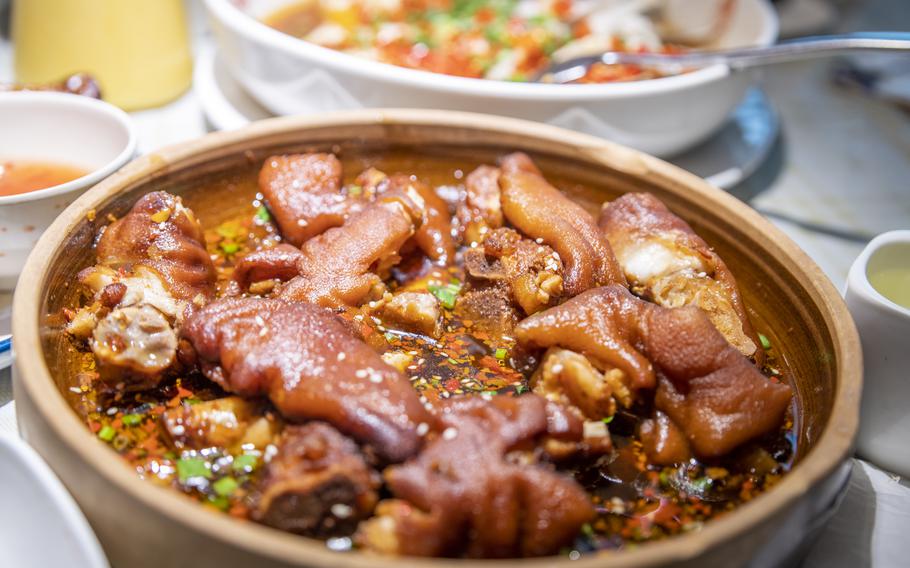
Foreign cuisine presents many opportunities for experimental dining. Pictured: Braised pig’s feet in brown sauce. (iStock)
Living overseas in the military provided our family with unique opportunities to learn about foreign cultures firsthand. We didn’t imagine what it would be like to be European while stationed in England and Germany, we simply lived it. We believed that sampling local foods was a necessary part of the experience, but many Americans shy away from this aspect of the adventure.
The pervasiveness of McDonald’s provides a safe haven for those whose taste buds are less adventurous, and some only leave their flavor comfort zone for benign dishes such as Italian pizza margherita, French crepes filled with Nutella, chocolate covered Belgian waffles, Spanish churros and German schnitzel.
While we ducked into many a European McDonald’s to hit the bathroom, my husband and I encouraged (READ: forced) our family to broaden their food horizons beyond french fries. This philosophy was not without its drawbacks, however, and we now have a host of interesting (READ: nauseating) tales of our experiences.
While awaiting housing in Stuttgart, my meat-loving husband ordered the “wurst salat” at a Vaihingen restaurant, envisioning the German version of a chef salad. However, what he was served was devoid of vegetables, unless you count the massive pile of sliced raw onions, which was tossed with julienned cold cuts that looked like fleshy rubber bands and tasted like the mystery meat in bologna and hot dogs.
One spring in Spain’s Costa Brava, I ordered fresh-caught fish at a restaurant overlooking the azure Mediterranean Sea. As the waiter set the dish before me, I could almost hear Billy the Big Mouth Bass singing “Take Me to the River” as the fish stared at me from the plate. Some may say it’s gauche of me to be turned off by whole-roasted fish, but it felt wrong eating a creature that looked like it might be enjoying the sea views.
On a fall trip to Berchtesgaden, one of our guests ordered the “Leberknodelsuppe” just because it was fun to say. Giggling, we all repeated the tongue-twisting word until the bowl was presented to the table. A large grayish dumpling sat in a broth bath, and although the color looked off, we kept an open mind. Cutting into the doughy ball, its pungent, iron-rich aroma clued us in on what should have been obvious – “leber” is liver, and this German delicacy was made from that particularly bloody organ meat.
One cannot escape getting caught up in the festive, albeit touristy, atmosphere at the Hofbrauhaus in Munich, and part of the experience is ordering a liter of beer and a heaping helping of hearty Bavarian food. Swinging my stein to and fro, I ordered the traditional “Schweinshaxe,” a Bavarian specialty. Not realizing I’d requested a roasted pig’s knuckle, I was surprised at the effort it took to extract the meat morsels that were tangled among cartilage, skin and bone.
On a day trip to Strasbourg, France, our family stopped at an outdoor restaurant on a lovely cobblestone square. Interested in the mix of German and French cultures, I ordered “Sûrkrût Royale,” an Alsatian sauerkraut dish. Soon, I was presented with a steaming heap of sauerkraut, with potatoes, onions, dumplings and at least seven different varieties of pork nested among its pickled strands. Wursts and pork loin were among the few cuts of meat I could recognize, but the rest were unidentifiable slabs intertwined with fat and sinew. Although I was squeamish about the gelatinous bits, the scent of bacon and white wine motivated me to plow forth, and I found the dish to be a delectable treat.
Despite the queasiness that inevitably springs forth when we recall these culinary tales, our family is still sampling indigenous cuisines. Be it Belgian mussels in creamy beer broth, southern shrimp and grits, spicy Croatian cevapi, saucy Japanese Okonomiyaki, traditional British bangers and mash, fresh Alaskan salmon, hearty Portuguese sopas or pork-filled Hawaiian manapua, every delicious regional dish we stumble upon makes it worth every fish head, hunk of fat and organ meat that makes its way to our table.
So, Buen Provecho, Smacznego, Smaklig måltid and Bon Appetit! But don’t forget to pack the Alka Seltzer just in case.
Read more at themeatandpotatoesoflife.com and in Lisa’s book, “The Meat and Potatoes of Life: My True Lit Com.” Email: meatandpotatoesoflife@gmail.com